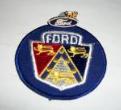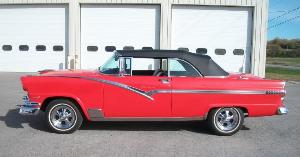|
Author
|
Message
|
|
Lanny White
|
|
|
Group: Forum Members
Last Active: Last Month
Posts: 80,
Visits: 33.0K
|
Forgive my ignorance please and don't beat me up because I have a STOCK 1954 4 barrel T-Pot on top of a stock 256 coupled to a stock 3 speed with overdrive.
I have read countless time on forums that the power valve in the carb can be damaged from backfires thru the carb. During initial timing and start-up I experienced many backfires, eventually getting it to run reasonably well. The carb has been rebuilt and the idle mixture screws have been adjusted by using a vacuum gauge. The float level is properly set and the auto choke appears to be working properly. The main jets are appropriate for the local elevation.
Now, the problem. Under load (pulling my 2,000 lb. vintage trailer up a grade) the engine coughs with too much throttle in third, I back off and shift into second with less throttle and it smooths out quite a lot but not completely. The coughing begins immediately if I give it more throttle. Could this issue be related to a failure of the power valve?
Now the ignorance! I have not opened the carb up to inspect the power valve but, when I do, is it glaringly obvious that a backfire ruined it or is the damage more subtle? How can I tell if it needs to be replaced?
|
|
|
|
|
Ted
|
|
|
Group: Administrators
Last Active: Yesterday
Posts: 7.5K,
Visits: 205.8K
|
The power valve on the model 2140 4V Holley (Teapot by another name) is the slotted brass fixture in the bottom of the fuel bowl between the two jets. The actuator for that is the long stemmed piece with a spring around the stem and that whole assembly is fastened to the fuel bowl cover with three screws. It hangs down into the fuel bowl and with the engine off or at full throttle, the stem is in the fully down position which is the enrichment mode for the power valve. When there is sufficient vacuum, the stem is pulled up thus allowing the power valve to be in the closed position for economy purposes. If the actuator fails, it typically does so in the down position which is ‘enrichment’ thus keeping the small stem on the brass power valve depressed and open. Your coughing or backfiring under full throttle indicates a lean condition or an ignition break down. The power valve would not be the problem in this case. A stopped up passage in the carb and possibly on the secondary side is a likely candidate. Likewise a breakdown in carbon core spark plug wires or other ignition component could be the culprit. That valve that's on the outside of the carburetor is very often mistaken for the power valve but is a spark control or advance valve for the distributor vacuum. I trust all that made sense.
  Lorena, Texas (South of Waco) Lorena, Texas (South of Waco)
|
|
|
|
|
Lanny White
|
|
|
Group: Forum Members
Last Active: Last Month
Posts: 80,
Visits: 33.0K
|
Thanks, Ted. I do have an ignition problem as well. I will be meeting a carb/electric guy tomorrow for a diagnosis but wanted to know more about the power valve before hand. I have Merc manuals available to cover carb issues - crossing my fingers. More later!
|
|
|
|
|
Lanny White
|
|
|
Group: Forum Members
Last Active: Last Month
Posts: 80,
Visits: 33.0K
|
Ted, I have other questions. If the power valve has been damaged due to the previous backfiring, would it cause it to be lean or rich? If I have to have further carb work, as stated in my previous question, what do I look for to determine whether or not the valve has been damaged?
|
|
|
|
|
oldcarmark
|
|
|
Group: Forum Members
Last Active: 3 Weeks Ago
Posts: 3.7K,
Visits: 32.6K
|
Lanny White (7/23/2019)
Forgive my ignorance please and don't beat me up because I have a STOCK 1954 4 barrel T-Pot on top of a stock 256 coupled to a stock 3 speed with overdrive. I have read countless time on forums that the power valve in the carb can be damaged from backfires thru the carb. During initial timing and start-up I experienced many backfires, eventually getting it to run reasonably well. The carb has been rebuilt and the idle mixture screws have been adjusted by using a vacuum gauge. The float level is properly set and the auto choke appears to be working properly. The main jets are appropriate for the local elevation. Now, the problem. Under load (pulling my 2,000 lb. vintage trailer up a grade) the engine coughs with too much throttle in third, I back off and shift into second with less throttle and it smooths out quite a lot but not completely. The coughing begins immediately if I give it more throttle. Could this issue be related to a failure of the power valve? Now the ignorance! I have not opened the carb up to inspect the power valve but, when I do, is it glaringly obvious that a backfire ruined it or is the damage more subtle? How can I tell if it needs to be replaced? Nobody on here will "beat You up" for having a Stock Setup. There are as many Guy's here with Stock or near Stock Vehicles as non Originals That's what is great about this Site. Everyone Respects all Types of Y-Blocks.
 
|
|
|
|
|
Tedster
|
|
|
Group: Forum Members
Last Active: 3 Years Ago
Posts: 513,
Visits: 153.3K
|
One method that should work, turning the idle mixture screws in fully clockwise will cause the engine to stall out. If not, this points to a defective power valve. It's normally held closed by engine manifold vacuum, opening only when engine load demands extra fuel as when accelerating. A defective power valve, one that is open constantly, will waste lots of fuel. Selecting the correct # power valve is important too for the same reason.
|
|
|
|
|
darrell
|
|
|
Group: Forum Members
Last Active: 3 Months Ago
Posts: 455,
Visits: 22.2K
|
y blocks like lots of advance.
|
|
|
|
|
Hoosier Hurricane
|
|
|
Group: Moderators
Last Active: Yesterday
Posts: 3.7K,
Visits: 323.0K
|
Your carb was calibrated originally for leaded, non-alcohol gasoline. When the country went to unleaded, I found some carbs needed bigger jets to run properly. Alcohol produces less heat, so required more fuel to run properly. In our area, we get a winter mixture of 15% alcohol instead of 10%. The winter blend starts in Sept. and ends in June. If you get 15% and haven't filled up yet this year, you are running lousy gas. You may have to increase your jet sizes a couple of numbers to get rid of your popping.
John - "The Hoosier Hurricane"

|
|
|
|
|
Ted
|
|
|
Group: Administrators
Last Active: Yesterday
Posts: 7.5K,
Visits: 205.8K
|
|
|
|
|
|
Lanny White
|
|
|
Group: Forum Members
Last Active: Last Month
Posts: 80,
Visits: 33.0K
|
Thank you all for your comments. I run non-ethanol fuel primarily but when it is unavailable (seldom) I add Star-Tron so it probably is not related to ethanol in the gasoline. I will check the mixture screws, as suggested, to see if there is adequate fuel to keep it running when closed. The carb was completely rebuilt about 2000 miles ago so the problems of age probably don't apply, but the power valve diaphragm seal may be a contributing factor. That can be determined if the carb has to be disassembled again.
More later after the carb/electric guy does his magic!
|
|
|
|